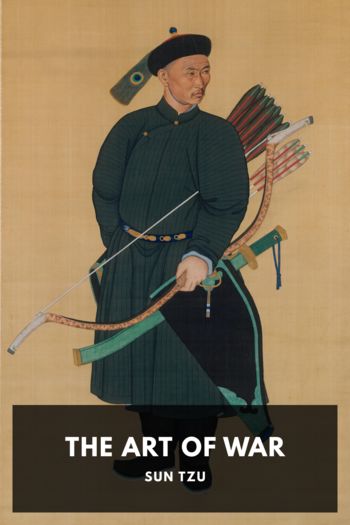The Art of War, Sun Tzu [best english books to read for beginners TXT] 📗

- Author: Sun Tzu
Book online «The Art of War, Sun Tzu [best english books to read for beginners TXT] 📗». Author Sun Tzu
The general, unable to control his irritation, will launch his men to the assault like swarming ants,227 with the result that one-third of his men are slain, while the town still remains untaken. Such are the disastrous effects of a siege.228
Therefore the skilful leader subdues the enemy’s troops without any fighting; he captures their cities without laying siege to them; he overthrows their kingdom without lengthy operations in the field.229
With his forces intact he will dispute the mastery of the Empire, and thus, without losing a man, his triumph will be complete.230 This is the method of attacking by stratagem.
It is the rule in war, if our forces are ten to the enemy’s one, to surround him; if five to one, to attack him;231 if twice as numerous, to divide our army into two.232
If equally matched, we can offer battle;233 if slightly inferior in numbers, we can avoid the enemy;234 if quite unequal in every way, we can flee from him.
Hence, though an obstinate fight may be made by a small force, in the end it must be captured by the larger force.235
Now the general is the bulwark of the State; if the bulwark is complete at all points; the State will be strong; if the bulwark is defective, the State will be weak.236
There are three ways in which a ruler can bring misfortune upon his army:—
By commanding the army to advance or to retreat, being ignorant of the fact that it cannot obey. This is called hobbling the army.237
By attempting to govern an army in the same way as he administers a kingdom, being ignorant of the conditions which obtain in an army. This causes restlessness in the soldier’s minds.238
By employing the officers of his army without discrimination,239 through ignorance of the military principle of adaptation to circumstances. This shakes the confidence of the soldiers.240
But when the army is restless and distrustful, trouble is sure to come from the other feudal princes. This is simply bringing anarchy into the army, and flinging victory away.241
Thus we may know that there are five essentials for victory:
He will win who knows when to fight and when not to fight.242
He will win who knows how to handle both superior and inferior forces.243
He will win whose army is animated by the same spirit throughout all its ranks.244
He will win who, prepared himself, waits to take the enemy unprepared.
He will win who has military capacity and is not interfered with by the sovereign.245
Victory lies in the knowledge of these five points.246
Hence the saying: If you know the enemy and know yourself, you need not fear the result of a hundred battles. If you know yourself but not the enemy, for every victory gained you will also suffer a defeat.247 If you know neither the enemy nor yourself, you will succumb in every battle.248
IV Tactical Dispositions249Sun Tzǔ said: The good fighters of old first put themselves beyond the possibility of defeat, and then waited for an opportunity of defeating the enemy.
To secure ourselves against defeat lies in our own hands, but the opportunity of defeating the enemy is provided by the enemy himself.250
Thus the good fighter is able to secure himself against defeat,251 but cannot make certain of defeating the enemy.252
Hence the saying: One may know how to conquer without being able to do it.253
Security against defeat implies defensive tactics; ability to defeat the enemy means taking the offensive.254
Standing on the defensive indicates insufficient strength; attacking, a superabundance of strength.
The general who is skilled in defence hides in the most secret recesses of the earth;255 he who is skilled in attack flashes forth from the topmost heights of heaven.256 Thus on the one hand we have ability to protect ourselves; on the other, a victory that is complete.257
To see victory only when it is within the ken of the common herd is not the acme of excellence.258
Neither is it the acme of excellence if you fight and conquer and the whole Empire says, “Well done!”259
To lift an autumn hair is no sign of great strength;260 to see the sun and moon is no sign of sharp sight; to hear the noise of thunder is no sign of a quick ear.261
What the ancients called a clever fighter is one who not only wins, but excels in winning with ease.262
Hence his victories bring him neither reputation for wisdom nor credit for courage.263
He wins his battles by making no mistakes.264 Making no mistakes is what establishes the certainty of victory, for it means conquering an enemy that is already defeated.265
Hence the skilful fighter puts himself into a position which makes defeat impossible, and does not miss the moment for defeating the enemy.266
Thus it is that in war the victorious strategist only seeks battle after the victory has been won, whereas he who is destined to defeat first fights and afterwards looks for victory.267
The consummate leader cultivates the moral law, and strictly adheres to method and discipline;





Comments (0)